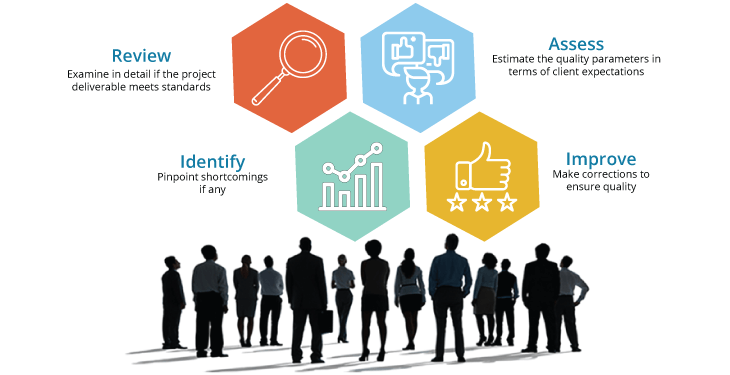
We often hear people asking why project management is essential. Handling projects tends to be an intimidating task. It requires a thorough understanding of project scheduling, planning, reporting, tracking, and the importance of project management. If you have also wondered why project management is essential, read on to understand better. To become a competent project manager, you need to have a detailed understanding of project management, the importance of project management, and various job roles.
Here you will learn why to use project management in different sectors, which may have their peculiarities. First, let us start with what project management is and what it entail

What is Project Management?
As defined by the Project Management Institute, “Project management is about the application of skills, knowledge, tools, and techniques to project activities to meet project requirements.” It also involves various policies, principles, and procedures to guide a project from initiation to completion.

Growing Importance of Project Management
The landscape of PM is changing with every passing day. It is crucial to keep pace with the trends if you are interested in understanding the benefits of project management.
While project management skills are not easy to learn in theory alone, doing a course does come with benefits. Investing your time in learning project management skills is worth investing as all employers prioritize PM. Project management also brings leadership and direction to projects.
Here are a few reasons why project management is essential:
1. A Clear Project Plan and Process
The more multifaceted the project, there is more scope for chaos in the organization. That is where proper planning and the importance of project management come in. The primary function of project management is to avoid confusion by outlining a clear plan and a process from the beginning to the end.
2. Establish a Plan and Schedule
Having agreed on a project schedule and sticking to it teaches the discipline required to avoid delays. A pre-determined process through the project lifecycle gives the project a clear path.
3. Teamwork
People are made to work in a team on a project due to the benefits that accrue through sharing and knowledge of skills. It inspires team members to collaborate on a project.
4. Maximize Resources
It is well known that human and financial resources are likely to be expensive. Project risk management and project tracking with regular reporting ensure the economic and efficient use of all the resources.
5. Keep Control of Costs
Based on the project scope, some projects may incur high costs. So, it is essential to keep track of the budget. Incorporating project management strategies eases the budget overrun risks.
6. Build on Knowledge
Businesses will acquire more experience over time when they embark on more projects. Project management serves as a company’s knowledge asset and helps build on experience and knowledge.
7. Manage Quality
It is crucial to ensure top-quality results. Project management identifies, controls, and manages standards. This results in a high-quality product/ service and a satisfied client.
8. Continuous Oversight
- Project management methods ensure that organizations gain control over ongoing projects and make sure they are on the right track and within the stipulated budget. Project deliverables should be managed well, so you do not lose track of the project’s progress.
A single failed project may not seem like a great thing to the company; nevertheless, when we talk about large organizations with multiple projects in the pipeline, the importance of project management increases manifold.
The absence of project management leads to chaos in the organization, which gradually induces higher rates of failure, uncertainty, and stress.
Why Do We Use Project Management?
Project management is about delivering outputs to maximize benefits to an organization. Listed below are some more convincing reasons why use project management. It provides:
- Clear Focus and Objectives
- Quality Control
- Risk Management
Strategic Alignment: Benefits for Organizational Projects
“Why is having strategic alignment in an organization important?”
Globally, organizations today are challenged to adapt to the changing business environment at a rapid pace. If they are to stay competitive in the field, organizations must be able to devise strategies for long-term business success and growth.
Without strategic alignment, project managers spend countless hours pursuing initiatives. For instance, there may be a priceless idea, but the time may not be right to focus on a project revolving around it. If organization strategies are not crystal clear to the employees, they are bound to lose faith in the mission, vision, and value of the organization. By ensuring strategic alignment in your organization, you can be sure that the benefits of project management will accrue.
So, what are the practical benefits of attaining strategic alignment in an organization?
Improved Speed in Decision-Making
Uncertainty can weaken productivity and lead to missed deadlines. Strategic alignment in an organization results in quicker decisions and reduced execution time. It is also why project management stresses clarity.
Better Employee Engagement
Strategic alignment in an organization is why project management dictates collaboration and communication with employees. When employees understand how their work complements the company strategy, they become more productive and content.
Minimal Wastage of Resources
Strategic alignment in an organization discerns between activities that spur growth and those that play more of a supporting role. A clear delineation ensures that the company uses limited resources for the right activities to facilitate growth and align functional and business priorities.
Reduced Customer Confusion
- A strategically aligned organization will have mechanisms to ensure that processes consistently deliver results. Besides, knowing the benefits of project management will equip teams to tackle technical glitches to ensure the seamless delivery of results.
It isn’t easy to achieve perfect organizational alignment. However, a better-aligned organization can reap the benefits of project management best.
Why Does Realistic Project Planning Matter?
No matter your industry, you will realize why project management is crucial to meeting deadlines. While unrealistic deadlines can mar a project, arriving at a timeline interactively with the team.

Members can help them identify with the project and volunteer to deliver the tasks on time. Scheduling, interacting, sharing, and reporting follow naturally, and you will understand why use project management as a tool to control progress.
How to Create a Realistic Timeline?
Before framing a timeline, it is essential to break your project into smaller and more manageable components. These small components, known as Work Breakdown Structure (WBS), make wielding control over any project easier. Following are a few tips on creating a realistic timeframe to realize the full benefits of project management.
- Choose a suitable project management tool
- Use WBS to breakdown work into smaller components
- Sequence activity in the order that they unfold
- Estimate activity resources and duration needed to complete the task
- Develop a timeline
Creating a timeline will put the project on the right track, but the importance of project management lies in task monitoring and execution.
Quality Control: Process and Benefits
There are strong reasons why use project management for quality control as well. While projects may be planned and monitored through their execution, a project manager cannot wait for customer reviews on quality after the project closes.
According to the American Society for Quality (ASQ), “Quality control consists of observation techniques and activities to fulfill requirements for quality.”

Quality control activities assess whether the product or service meets the quality requirements specified in a project. They are:
- Validating project deliverables
- Meeting stakeholders requirements
- Identifying reasons for poor product quality
- Taking action to eliminate quality-related problems
It is essential to use the right inputs like a project management plan, quality checklist, quality metrics, work performance, and deliverables to implement quality control. Quality control is top of the list of project management’s benefits.
Quality Control Process
The quality control process encompasses auditing project results (deliverables) to scrutinize their compliance with quality standards. Continuous project management audit provides ample time to come up with solutions to problems.
The quality audit comprises these steps:
- Gather and analyze quality control measurements
- Identify non-conformance to quality parameters in the deliverables
- Recommend corrective actions, preventive actions, and quality improvements
- Validate procedures for fault reduction
- Review the results of corrective actions initiated and generate quality control reports
For efficient project implementation, it is also essential to carry out quality control activities and quality compliance processes.
There are plenty of software tools developed to help the quality management process. The quality team and project manager should use such tools to keep an eye on errors, suggest corrective actions, and ensure that the project deliverable is produced in line with customer needs and quality requirements.
Maximum Resource Utilization: Why is it Useful?

Organizations put a lot of effort into resource allocation. As your team grows, assigning people to multiple projects in the pipeline simultaneously becomes tricky.
One of the best ways to check whether your resource allocation strategy is successful is to track team utilization patterns. Before diving deep into resource utilization and its associated formula, let us define resource utilization as one of the benefits of project management.
Resource Utilization: Definition, Formula, and Benefits
Tracking how much time team members spend on assigned tasks helps to track resource utilization. One of the reasons why we use project management is to assess resource utilization; the most straightforward percentage measure is to consider the number of hours worked by the total time that the resource could have been utilized.
Resource Utilization Formula: Busy Time / Available Time
If the resource utilization percentage is lower than estimated, it indicates that pending tasks have blocked scheduled tasks. If the delayed, scheduled tasks are critical to the project, there is a danger of missed deadlines, cost escalation, and lack of deliverables. A more worrying aspect of lower utilization is that the project may be over-staffed.
Conversely, if the resource utilization percentage is higher than estimated, it could, on the one hand, mean the project is understaffed. On the other hand, it could also mean that resources have been productive.
Maximum resource utilization is thus top on the list of benefits of project management. Here is how:
- Productivity increases when resource utilization is optimized. It discourages under-performance among staff and guards against burnout
- Maximizing resource utilization promotes visibility in project management, and there is a reduced risk of oversights
- There is a guaranteed improvement in ROI when resources are utilized intelligently without over-exploitation
- Project managers who use resource utilization can handle technical glitches through the redeployment of resources
Risk Management
When utilizing resources to innovate, a project is also exposed to considerable risk as there are many challenges and uncertainties. Thus, risk management, one of the critical benefits of project management, plays a vital role in the success of a project.
Risk management is a methodology to identify, analyze, and minimize issues that could adversely affect the progress of projects. If the risks remain unaddressed, the project may fail in several ways, including overshooting the budget, miss deadlines, and disappointing the client. Hence project management insists on risk management strategies.
A definite risk management plan helps you be prepared to deal with uncertainties and reduce overheads by saving valuable resources like time, people, and income.
So risk management is part of the benefits of project management:

-
- Risk Identification The first step in the risk management process is identifying risks early during the project. Though it is impossible to predict every single challenge to the project, sifting through individual threats will help you spot dangers in advance.
-
- Qualitative Risk Analysis Next, it is essential to identify risks in order of perceived severity and prioritize which of them to address first. Despite being subjective, these risks pose a real threat. Resources may then be identified to manage the risks as per a schedule.
-
- Quantitative Risk Analysis Some risks are “probabilities” due to which the project outcome may be adversely affected. These risks can be evaluated numerically and examined carefully before holding a dialogue with stakeholders and experts outside the project ambit to mitigate them.
-
- Risk Response Techniques Based on the risk in question, threats require a timely response. Determining the right solution is the essence of risk mitigation.
- Risk Control Once the planning is complete and the project initiated, the project manager will spend time managing the risks involved. The risks identified and the adjustments made should be documented in the risk register after the project scope is suitably altered.
Role of Subject Matter Expertise in Project Management
At the project’s inception, the team and the project manager require accurate inputs to discharge their duties. While the project sponsor can fund the project, only a subject matter expert (SME) can provide topic-related information, insights, and knowledge to carry forward the project.
Hiring an SME must ensure that the facts and data gathered are correct and that the project deliverables meet stakeholders’ requirements, policies, and best practices. An SME ensures the benefits of project management by providing the following services:
- Guards against dilution of project deliverables, with in-depth inputs on all related issues
- Oversees changes to processes and rules, to keep project objectives intact
- Shares training material and encourage user documentation
- Tailors test cases and validate the results obtained by running such test drills
- Evaluate the usability and accuracy of the product or service in the final phase of the project and give feedback
- Authenticates requirements and deliverables produced by the project
Project Management Information System
Right from the initiation stage to the closing stage, a lot of data is collected, analyzed, and transformed. With the implementation of various processes in the project life cycle, this unique data is collected and shared with other team members. The data collected is analyzed and later converted into project information through various processes. The acquired information is communicated verbally to the team members or stored and distributed in multiple formats as reports.
The project management process information plays a crucial role, and it is divided into three methods, and they are:
1. Work Performance Data
This method is about the observations and measurements made towards all the work carried out by the project manager and his/her team. The work performance data includes information about the project activities like defining the percentage of work completed physically, technical and quality performance measurement of the project, and providing updates on the scheduled work/activities (start and finish date). It also includes the total number of change requests that have occurred during the execution of the project and the number of defects detected in the project. The work performance data also includes information about the actual cost of the project, the exact time taken to complete a scheduled task, and so forth. All the above details are usually recorded in a ‘Project Management Information System’ – (PMIS) and project documents.
2. Work Performance Information
The project management plan should include a systematic collection of work performance information. The gathered information is essential and serves as a guidance tool for conducting quality control measures and programs. Work performance information helps measure the project deliverables’ status, ensures that the required corrective actions are carried out, and assists in creating performance reports. Analyzing the work performance information is crucial for the project management plan and should be considered a priority at all times. This method efficiently uses allocated resources, helps identify potential risks, and acts as a useful project management tool.
3. Work Performance Reports
Work performance reports result from the Monitor and Control of project work process and act as an input to various managing and controlling processes. As the name suggests, performance reports include different information and data about the project’s parameters and updates on the project’s progress. The work performance report organizes and summarizes the information gathered through the work performance data and work performance information methods and presents it to the project’s stakeholders so that they can understand the direction or progress of the project. These reports show the stakeholders the current status of the project and its performance against the planned baseline. In certain circumstances where the stakeholders notice that the project is not progressing according to the plan, they will take corrective measures to ensure that the project is completed within the prescribed budget and time.
The Project Information processes help in generalizing the methods used to collect relevant and accurate data that is further used to determine the project’s scope and progress. All the necessary steps and practices are carried out using this crucial information. Its the project manager’s decision to make which inputs, tools, techniques, and outputs are to be used to ensure the project’s completion. Using all the processes is not mandatory, as they are different for every project. These inputs, tools and techniques, and outputs are considered more of an aspiration to the project managers. One should follow them as and when possible within the project’s constraints, environment and industry.
Change in Project Management
Traditionally, the project manager was the key link between all project members. He was the sole decision-maker of all project-related activities and the only source through whom any progress or updates would be communicated within the team. Hence, a project’s chances of success or failure depended highly on how a project manager handled all these tasks. Therefore, the project manager first had to gather all information from every team member and then communicate to everyone through meetings or mailers. The whole process sometimes ended up being a burden on him or her. This is one of the main reasons for the shift towards social project management.
Today, project management focuses on the following:
- Collaboration and communication
- Social media elements
- Transparency
- User-friendly features
The Emergence of Social Project Management
The present-day scenario has changed, with communication within the team taking place through social project management tools and business collaboration software. These are collaborative tools that increase the chance of participation by team members and thereby enhance productivity. The term used to describe this change is social project management.
Advantages of Social Project Management
-
Global Communication
The use of social media has a tremendous impact in terms of global communication. According to PMI’s ‘Pulse of the profession: The High Cost of Low Performance’, effective communication enhances organizational performance. In a geographically spread project environment, where teams may be working across countries, social project management tools and techniques enable all team members to be on the same page.
-
Collective Intelligence
Collaboration essentially involves contributions by people from different backgrounds. Collective intelligence evolves from collective contribution and competition among individuals. This kind of work structure also lets team members probe into the decision-making process owing to the transparency of social media platforms. The executives and project managers select the appropriate decision per team members’ input.
-
Building New Customer Intelligence:
Social media tools’ collective influence also helps develop stronger customer relations. Customers and clients can actively participate in social media tools and provide their input on particular products and services. Based on customer feedback, project strategies can be changed immediately through transparent communication channels with all team members. Customer feedback through direct channels helps quickly adjust project strategies and plans.
-
Utilize Skills of People Outside Team
Although the team members only contribute towards the success of a project, sometimes those outside the team may also have valuable inputs to add. Social project management makes it convenient to draw inputs from external entities. You can post a query on a social forum that an entire organization or a specific department can access. Your query will be read and answered by people from various backgrounds. Hence, you will have a variety of inputs.
-
Accomplish Goals Faster
Social project management allows everyone to keep up with the various activities undertaken as part of a project. The relevant parties can also ask questions without having to send numerous emails in case of doubts. With communication between team members, stakeholders, and other relevant parties being optimized, productivity enhances, and goals are accomplished faster.
-
Team Empowerment
Social project management brings the organization closer. Everyone inside and outside the team can share their views, discuss, and interact.
-
Networking
In a multinational giant like IBM or Accenture, one project manager hardly knows another in another corner of the world. For example, a project manager handling a team in San Francisco posts a query concerning his project on the organization’s business collaboration software. Someone with expertise in the same field replies to his post and helps with his project. This type of networking is essential for project managers to enhance their visibility and boost their careers.
-
Partners with Agile
A significant change in project management is the adoption of the Agile technique. One of the main elements of this technique is collaboration. Social project management can facilitate the achievement of this objective.
Social project management has taken the world of networking and information sharing to a new level. Gone are the days when you had to open your email or attend a meeting to be a part of a discussion and express your views. Today you can be part of the discussions on the other side of the world with just a click of your mouse. Social networking forums are leveraged highly today by organizations owing to the transparency of the system, ease of communication, and efficiency in sharing information.
Conclusion
Wrong approaches to work will lead to chaos and prevent you from realizing the benefits of project management; an inefficient project manager may make cardinal mistakes in planning which may increase risks and cause failure, leading to an inferior quality of deliverables and dissatisfaction with customers. The importance of project management lies in the ability of the project manager to create motivated teams that deliver quality and satisfy clients.
Know more about project management best practices through Invensis Learning’s Project Management certification training on PMP Online Training, CAPM Online Classes, PRINCE2 Course, Project Management Fundamentals, P3O, and MSP. We are a trusted training partner for Fortune 500 companies and Government institutions globally.
————————————————————————————————————————————Organize Corporate Group PMP Certification training for your teams around the world
Invensis learning provides In-person and live virtual instructor-led corporate training program customized for enterprise teams who wish to train their employees on specific aspects of their job processes or responsibilities. The corporate training by our expert certified trainers will enhance your learning curve and enable your teams to utilize their skills to meet industry standards.
- Experienced & Industry Specific Trainers
- Lifetime LMS access
- Deliver sessions across continents via In-Person/ Virtual Instructor-Led Training
- Customized Training————————————————————————————————————————————

















